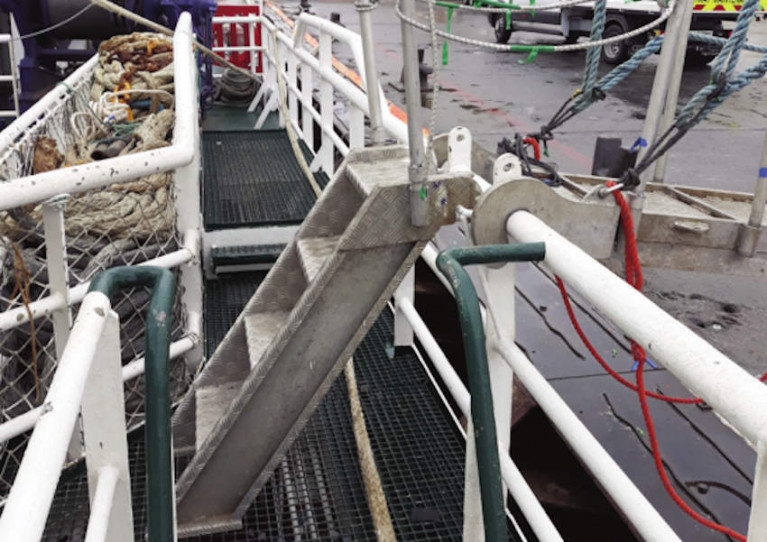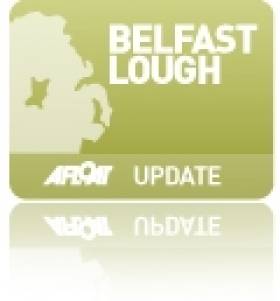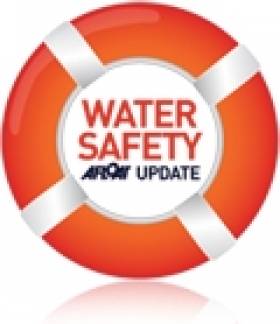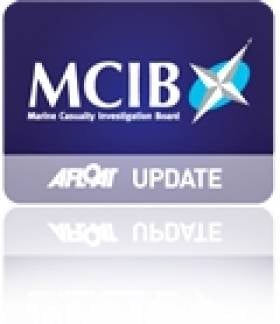Displaying items by tag: alcohol
The latest Marine Notice from the Department of Transport, Tourism and Sport reminds fishing crews of the dangers associated with boarding and transiting across vessels, especially under the influence of alcohol.
The move is in response to recent reports from the Marine Casualty Investigation Board (MCIB), which found that alcohol was a factor in two unrelated incidents in Killybegs, Co Donegal in March 2019 and Rosslare, Co Wexford in May 2019, as reported by Lorna Siggins on Afloat.ie last month.
The notice also reminds of the duty of care on the part of owners and skippers “to provide a safe means of access to vessels while in the harbour and that a gangway or other suitable means, providing an appropriate and safe means of boarding a vessel, shall be made available”.
In addition, all those accessing vessels or working on exposed decks “whether at sea, in harbour or combing two and from moorings” must wear a personal flotation device, or PFD, which “will increase your chance of survival in the event of entering the water”.
The department highlights the risks associated with the consumption of alcohol and/or drug consumption and the dangers associated with boarding and transiting across vessels.
“It is evident from the recent MCIB reports that alcohol consumption continues to be a significant factor in marine incidents,” it says.
“A number of incidents have occurred where diminished human performance due to the effects of alcohol consumption have been primary causes or contributing factors, leading to the loss of life in some cases.
“Alcohol speeds up the rate of body cooling and thus increases the risk of hypothermia in the event that you fall into the water.”
Marine Notice No 25 of 2020 is available to download below.
Drinking & Boating? Think Again - Alcohol Persists As ‘Significant Factor’ In Marine Incidents Says DTTAS
#Alcohol - Alcohol consumption “continues to be a significant factor” in marine incidents involving recreational craft.
That’s according to the Department of Transport, Tourism and Sport (DTTAS), whose latest Marine Notice highlights the risks to the public associated with drink and drugs when operating or simply travelling on the water.
The DDTAS cities “the concern expressed” by the Marine Casualty Investigation Board (MCIB) over the number of incidents it has investigated since 2010 that involve alcohol.
As laid out in a previous Marine Notice from 2012, the law requires that masters or owners of pleasure craft must not operate their vessels or allow others to do so while under the influence.
Similarly, any person on board such craft must not consume drugs or alcohol in circumstances that could affect theirs or others’ safety. Persons being towed or on board any vessel or object being towed by a pleasure craft must also avoid drugs or alcohol.
A fixed penalty of €150 applies to any failure to comply with this law, with potential for prosecution and fines of up to €5,000.
Moreover, fines of up to €100,000 and prison terms of up to two years may apply in cases where “deliberate or reckless action” under the influence is a factor.
More details can be found in Marine Notice No 15 of 2017, a PDF of which is available to read or download HERE.
#BelfastLough - The Belfast Telegraph reports that a Russian sailor found drunk in charge of a ship in Belfast Lough has been given a 12-month conditional discharge by Belfast Magistrates Court - and will now be sacked from his post and sent back to Russia.
The court heard that engineer Mikhail Irusglotov, 53, was found intoxicated on board the Fluvis Taw last Friday 28 March by the ship's captain, who believed he was too drunk to work if required despite being off duty at the time.
After being brought to court on Saturday and released on bail till yesterday's hearing, he was arrested again later that day after failing a second sobriety test.
The Belfast Telegraph has more on the story HERE.
Marine Notice: Alcohol and Drugs Onboard Pleasure Craft
#WATER SAFETY - The Department of Transport, Tourism and Sport (DTTAS) has published a Marine Notice addressed to all pleasure and recreational craft owners, masters and users to remind the public of the law in relation to being under the influence of alcohol and/or drugs when operating or being on board a vessel in Irish waters.
The 2010 Annual Report of the Marine Casualty Investigation Board (MCIB) highlighted the dangers inherent in excessive alcohol consumption while on board or operating a vessel and emphasised the relevant legislation under the Pleasure Craft (Personal Flotation Devices and Operation) (Safety) Regulations.
While operating a pleasure craft, being towed or on board any floating vessel, it is against the law to be under the influence of alcohol or drugs or any combination of drugs or of drugs and alcohol to such an extent as to be incapable of having proper control of the craft.
It is also against the law to consume alcohol or drugs in circumstances which could affect the safety of others on board or others using Irish waters, or create a disturbance on board or be a nuisance to others using Irish waters.
It is a requirement for the master or owner of a pleasure craft to take all reasonable steps to ensure that persons comply with the regulations.
The Maritime Safety Act 2005 also contains a range of provisions relating to the prohibition on operating a vessel in Irish waters while under the influence of alcohol or drugs, the breaking of which can lead to fines of up to €5,000 and up to three months' imprisonment.
Full details are outlined in Marine Notice No 56 of 2012, a PDF of which is available to read or download HERE.
Quo Vadis Deaths Result of Misadventure, Says MCIB Report
Investigators have published their investigation report into the death of two yachtsmen off Inishboffin in October last year.
Donal McEllin, 63, and Ger Feeney, 56, died while attempting to return to their motor yacht Quo Vadis in the early hours of 10 October.
The inquiry by the Marine Casualty Investigation Board (MCIB) found that the pair had set off for the yacht - which was moored in Inisboffin Harbour - on a motor-driven inflatable tender after several hours socialising in Day's Pub on the island.
The report also found that they had declined an offer to be ferried back to the yacht.
A witness, Ian Day, recounted that he drove his jeep to the end of the pier and used his headlights to assure himself that the tender had reached the vessel. Though it had been agreed with both men that they would turn off the external lights on the vessel when they safely boarded, it was assumed that they had forgotten.
The bodies of both men were discovered the following morning. Mr. McEllin’s body was found lying on West Quarter Beach adjacent to where the vessel was moored, while Mr. Feeney’s body was found afloat, lying under the upturned tender. Mr. McEllin’s lifejacket had inflated but was entangled around his neck, indicating that the groin strap was not properly tied.
Based on the available evidence, the MCIB concluded that the deaths were the result of attemping a night-time transfer from a small inflatable boat to a larger vessel swinging on its mooring, combined with "possible tiredness and diminished human performance resulting from the effects of alcohol".
The full MCIB report is available for download below.




























































